Public Missiles Tiny Pterodactyl
Public Missiles - Tiny Pterodactyl {Kit}
Contributed by Nick Esselman
| Construction Rating: | starstarstarstarstar_border |
| Flight Rating: | starstarstarstarstar_border |
| Overall Rating: | starstarstarstarstar_border |
| Published: | 2012-01-01 |
| Manufacturer: | Public Missiles  |
When I saw the new release of the Tiny Pterodactyl I had to get one...so I did. It arrived 1 week before a planned trip to Michigan where I was going to be flying at 3 Oaks. So I had a short period of time to build it. But that was all I needed with the ease of this kit.
This was my third PML kit, but only my first using Quantum Tube. I have been very pleased with my Callisto (Level 1 Cert Rocket) and Phantom so I was expecting nothing less. In addition all three rockets are based on the 2.1" airframe and all have the exact same nose cone.
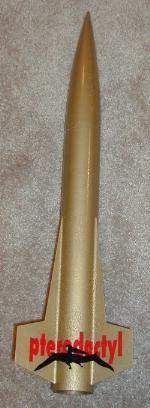 The Tiny Pterodactyl is the hatchling compared to the large 7.5" Pterodactyl and the 3.9" Pterodactyl Jr. As stated it has a 2.1" airframe and stands 25.5" tall. It comes configured with a 29mm motor mount.
The Tiny Pterodactyl is the hatchling compared to the large 7.5" Pterodactyl and the 3.9" Pterodactyl Jr. As stated it has a 2.1" airframe and stands 25.5" tall. It comes configured with a 29mm motor mount.
The kit includes a pre-slotted 2.1" diameter Quantum (QT) body tube. It uses three (3) 0.062" thick G10 fins with through-the-wall-to-the-motor-mount tabs. It has a standard (sturdy) PML 2.1" Nose Cone. A standard PML Piston Recovery system with a Piston, a 3' Piston Strap, a 9' Tubular Nylon Shock Cord, and an 18" PML parachute. A 29mm motor tube and two 3/16" plywood centering rings. Two (2) 3" Brass Launch Lugs for a 1/4" rod. And lastly a single peel-n-stick decal.
CONSTRUCTION:
There are seven (7) 5.5" x 8.5" pages of instructions with the kit, plus an insert for the Dura-Chute (preparation and folding), an insert for Do's and Don'ts of Quantum Tubing, an insert for the Piston Recovery system, and an insert for tying Tubular Nylon. The instructions are thorough and include illustrations to assist in every aspect of building the rocket. The CP is identified in the instructions along with instruction for dealing with CG.
First, PML recommends the use of epoxy for the assembly of this rocket. I wanted to try something different. I had purchased some ProBond Polyurethane Glue. It is called "The Ultimate Adhesive", "Bonds Virtually Everything", "Super Strong", "Sand Easily", "Water Proof", and "Stainable/Paintable". The outside cover said that it is the strength of epoxy without the mixing. So I went for it.
 In general, I found the glue easy to work with exception for one primary issue. It expands in volume after being applied. (notice in the picture the difference from the wet on left to fully cured on right) This was not a problem for attaching the centering rings to the motor tube and to the inside of the body. It was fine for attaching the strap to the motor tube and to the piston. It was fine for mounting the fins through-the-wall to the motor mount. It did not appear that it would work well for the fin fillets so I didn't use it. I did fillet the rear centering ring and piston (see below) and it did okay there. The main problem is that you just don't know how much it is going to expand on you. Once dry it appears porous, but it does sand easier than epoxy and I had no primer interactions.
In general, I found the glue easy to work with exception for one primary issue. It expands in volume after being applied. (notice in the picture the difference from the wet on left to fully cured on right) This was not a problem for attaching the centering rings to the motor tube and to the inside of the body. It was fine for attaching the strap to the motor tube and to the piston. It was fine for mounting the fins through-the-wall to the motor mount. It did not appear that it would work well for the fin fillets so I didn't use it. I did fillet the rear centering ring and piston (see below) and it did okay there. The main problem is that you just don't know how much it is going to expand on you. Once dry it appears porous, but it does sand easier than epoxy and I had no primer interactions.
Construction is very straight-forward on the Tiny Pterodactyl. I did alter the construction process in a couple of ways and will touch on those below.
The instructions initially have you install the rear (notched) centering ring onto the motor tube and then to slide the piston strap through the notch to glue to the motor tube in the next step. I reversed this process only because I saw myself having trouble sliding it through the notch afterward. I had to sand the inside diameter of both centering rings slightly to get a good fit. The ProBond Polyurethane glue performed very well here and may be a good alternative (and cheaper) than epoxy.
The fins fit perfectly both into the QT and all the way to the motor mount. For internal fillets, I used the Polyurethane glue by squeezing it onto the joint between the motor tube and fin and then holding the rocket at a downward angle until the glue had run to the end of the fin tab, I then set it horizontal to stop the running. This worked well, too, with one exception. I got a run that found its way out of the fin slit and ran across the fin. I was able to clean this off of the G10 fin using a razor blade.
I used epoxy for make the fin fillets since the Polyurethane glue expands.
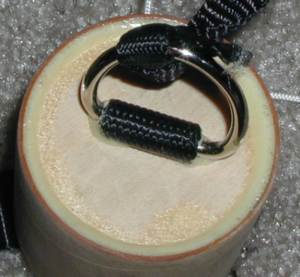 In building the piston, the Polyurethane did fine but since it takes much longer to set than 5-minute epoxy I had to tape the little tab on the strap back to the bulkhead. The piston also required a lot of sanding to get it to fit and move smoothly in the Quantum Tube. This is different than my previous experience with PML kits. The Callisto didn't require any sanding and the Phantom only required a little.
In building the piston, the Polyurethane did fine but since it takes much longer to set than 5-minute epoxy I had to tape the little tab on the strap back to the bulkhead. The piston also required a lot of sanding to get it to fit and move smoothly in the Quantum Tube. This is different than my previous experience with PML kits. The Callisto didn't require any sanding and the Phantom only required a little.
Two other changes I made were the adding of blind T-Nuts to the rear centering ring before gluing in place and the use of Rail Buttons instead of Launch Lugs. The latter is a bit concerning because of the piston that slides inside of the airframe. The Rail Buttons had to be mounted so as not to interfere with this piston. I mounted mine at 1/2" and 7 1/4" from the rear. The one at 7 1/4" leaves plenty of room for the piston, parachute, shock cord, and nose cone without hitting the screw that protrudes into the airframe.
Finishing was fabulous with QT. I used 320 grit all over the entire surface of the rocket and fins. I used 220 on the nose cone. I then primered with Plasti-Kote Sandable Primer. I used a thick coat on the nose cone. I sanded everything again with 320. Primed a 2nd time. I sanded and did the nose cone 2 more times to fill in a slight mold line. I ended up using some left over Rustoleum Hammer-look Gold paint. (just like this stuff, but really took away from the smooth finish the QT would allow). I then applied the decal. I should have then used a clearcoat to seal the peel-n-stick decal, but I was already in Michigan a day before the launch.
Overall, for CONSTRUCTION I would rate this kit 4 ½ points. The parts were of great quality and the fit of the fins was perfect. Motor retention would be nice and there is definitely room for it. The biggest disappointment was the amount of sanding I had to do on the piston.
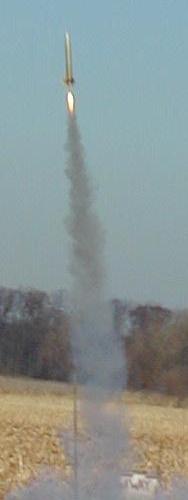 FLIGHT/RECOVERY:
FLIGHT/RECOVERY:
PML recommends motors ranging from the F37 (810 feet) to an H55 (4432 feet) and everything else in the 29mm range.
The altitudes above are based on a finished weight of 18 ounces. Surprisingly my finished weight was 17 ¼ ounces. This is surprising because my finished kits are usually so much off of the manufacture's finished weight. Some heavy, some light, just never this close.
My first flight was on an F40-7 (left), which PML says should get 1639 feet. The F40 I was using had failed to light 7 times with various ignitors, so I also used a QuickBurst Slim Gem which I had to build into the motor because it was slightly too large to pass through the nozzle. It lit. It launched. I barely got the picture and it was a great flight despite the high winds. It landed about 50 feet from the pad. F40's and Econojets will be good launch companions with this one (although I have G25-10 that might find its way into the Tiny Pterodactyl).
I felt that the descent was very fast (although it was appreciated with the wind on that day). Parachute size calculators suggest that the parachute should be 30" in diameter. PML provides an 18" with a 3.5" spill-hole. It comes down fast. PML does offer a 24" parachute option (for regions with hard landing surfaces...can you say desert?).
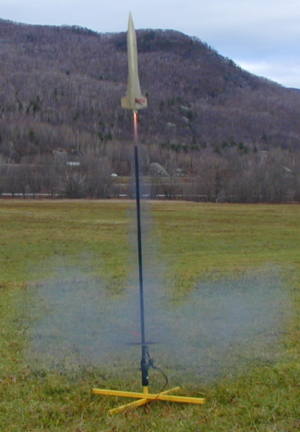 My next flying opportunity required a 24mm adaptor so I could fly it using my 24mm RMS system. I flew it three more times on E28-4's. RockSim says 606 feet with my rocket's weight. This is great for the small field.
My next flying opportunity required a 24mm adaptor so I could fly it using my 24mm RMS system. I flew it three more times on E28-4's. RockSim says 606 feet with my rocket's weight. This is great for the small field.
The first flight (right) was straight and true. Ejection was with a "pop" as the piston "popped" out of the tube. Descent was fast and it was recovered without damage.
The next flight (same day), I couldn't get the piston back in to where it was nor did it slide easy. I pushed it in and twisted it back and forth and up and down. When it came out it had black stuff on it. I didn't have sand paper with me, so I scrapped the piston lightly with a hobby knife until all the black was removed. Repeated that process again before it slide nicely in the tube. Then I launched it.
This time is seemed to come off the pad at a slight angle. It looks like (from a picture) that my ignitor leads went up with it and pulled off just as it was leaving the rail. Let this be a reminder to self and all reading to secure those ignitor leads at the base of your launch pad. The flight was successful, just at an unplanned angle.
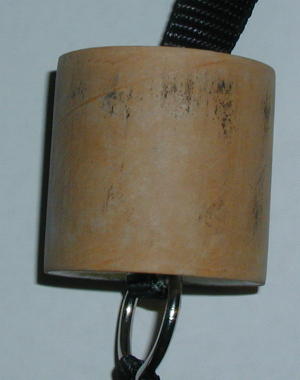 The fourth flight (3rd on E28-4) was the next day in absolutely perfect calmness. I had the same trouble with the piston (right) so I sanded it to remove all the black stuff before going out to the launch field. The flight was as the first E28. Straight and true with ejection at apogee. This is a good small field motor and rocket combination. PML should advertise it with 24mm motors E30 SU, E28 RMS, F24 RMS and F39 RMS. I'll be flying it on the 24mm F's too. I don't expect too much more altitude (200 feet) since the 24mm RMS F's are only 10 newtons more than the E's...baby F's so to speak.
The fourth flight (3rd on E28-4) was the next day in absolutely perfect calmness. I had the same trouble with the piston (right) so I sanded it to remove all the black stuff before going out to the launch field. The flight was as the first E28. Straight and true with ejection at apogee. This is a good small field motor and rocket combination. PML should advertise it with 24mm motors E30 SU, E28 RMS, F24 RMS and F39 RMS. I'll be flying it on the 24mm F's too. I don't expect too much more altitude (200 feet) since the 24mm RMS F's are only 10 newtons more than the E's...baby F's so to speak.
For FLIGHT/RECOVERY, I would rate this kit 4 ½ points. I'm really not sure why I'm having so much trouble with this piston system. I have never had trouble after getting the initial fit. I'm wondering if the Quantum Tube attracts more soot than the PML Phenolic tubing. Don't get me wrong, I LOVE the piston systems! This one is just taking a little more work than the rest. Descent rate is flier's choice, but the 18" with 3.5" spill hole is fast. RockSim says 19 feet/sec but another calculator says 25 feet/sec. It's fast. The rocket is tough and can take the landings though so maybe it's a blessing in disguise. The remainder of the flying experience is great. This is a stable rocket and possibly the only one by PML that can fly on 24mm E motors. Why would PML want that? To reach some additional fliers. Get a couple of designs under 16 ounces and they will, no doubt, have new customers.
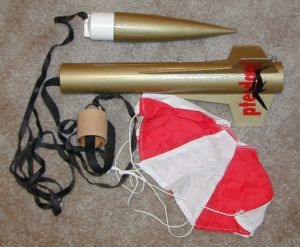 Overall, the Tiny Pterodactyl is a nice addition to the PML and my flight. I'm glad I built it because it had been a long time since I built a PML kit and to experience Quantum Tubing. I would recommend this kit to anyone wanting to try a mid-power kit. I would suggest getting the 24" parachute option and also building up a 24mm adaptor. Remember, it doesn't have to be out-of-sight (literal) to be an out-of-sight (slang for cool) flier. Quality components and unique looks makes this a nice rocket to add to the fleet. Then start thinking about the Pterodactyl Jr. or even that ultimate 7.5" Pterodactyl. I give the kit an OVERALL rating of 4 ½ points.
Overall, the Tiny Pterodactyl is a nice addition to the PML and my flight. I'm glad I built it because it had been a long time since I built a PML kit and to experience Quantum Tubing. I would recommend this kit to anyone wanting to try a mid-power kit. I would suggest getting the 24" parachute option and also building up a 24mm adaptor. Remember, it doesn't have to be out-of-sight (literal) to be an out-of-sight (slang for cool) flier. Quality components and unique looks makes this a nice rocket to add to the fleet. Then start thinking about the Pterodactyl Jr. or even that ultimate 7.5" Pterodactyl. I give the kit an OVERALL rating of 4 ½ points.
 |
 |
Flights
 |
 |
P.B. (February 25, 2007)
Sponsored Ads
 |
 |












B.C.C. (December 4, 2001)